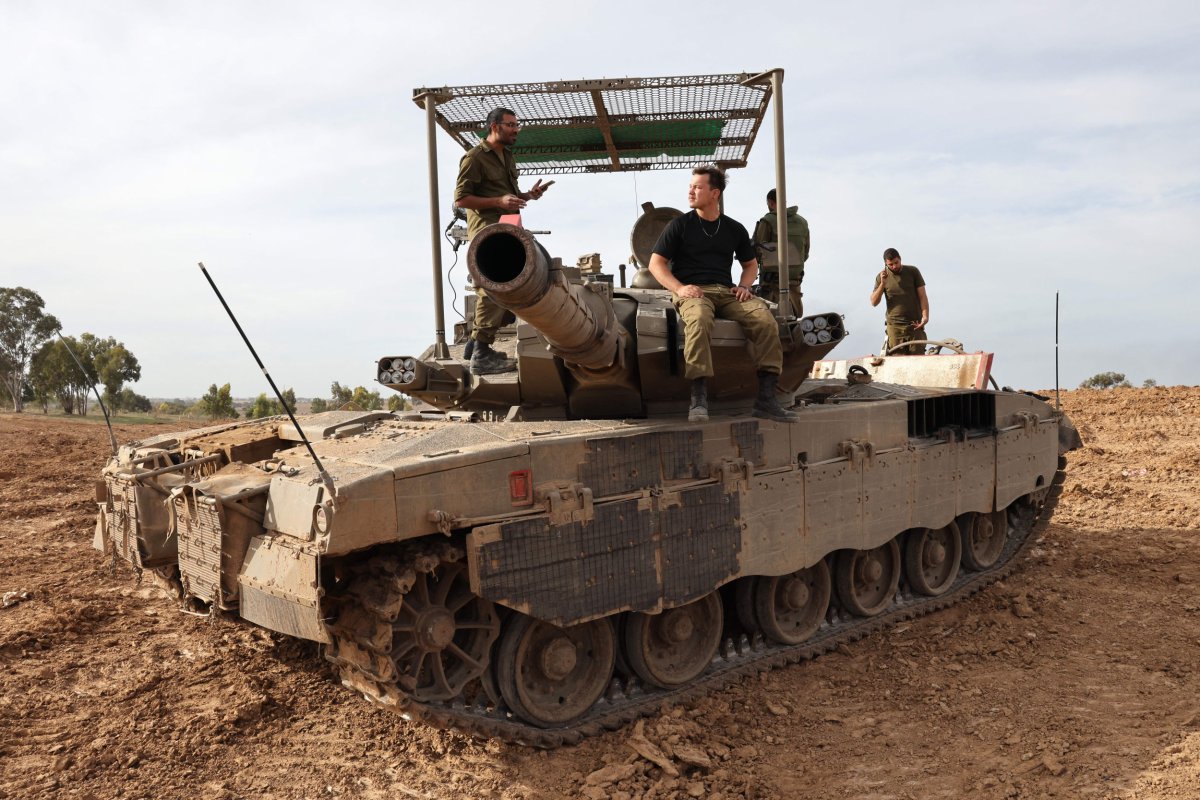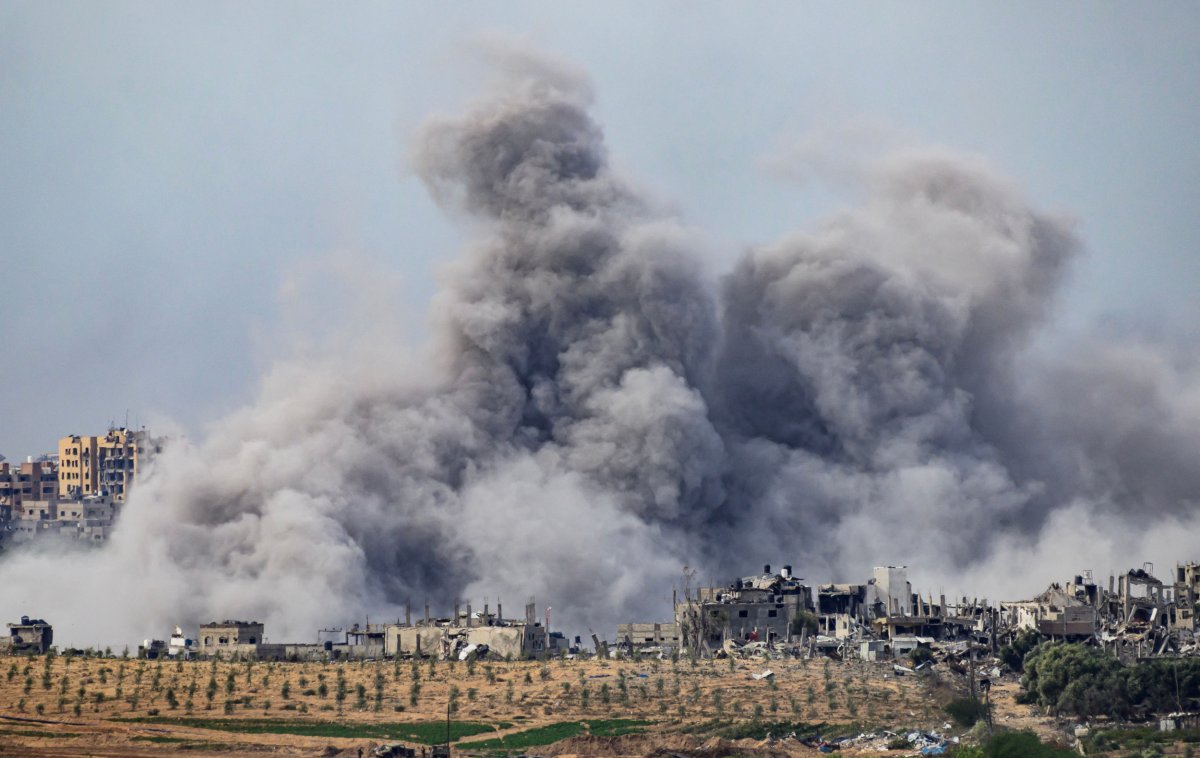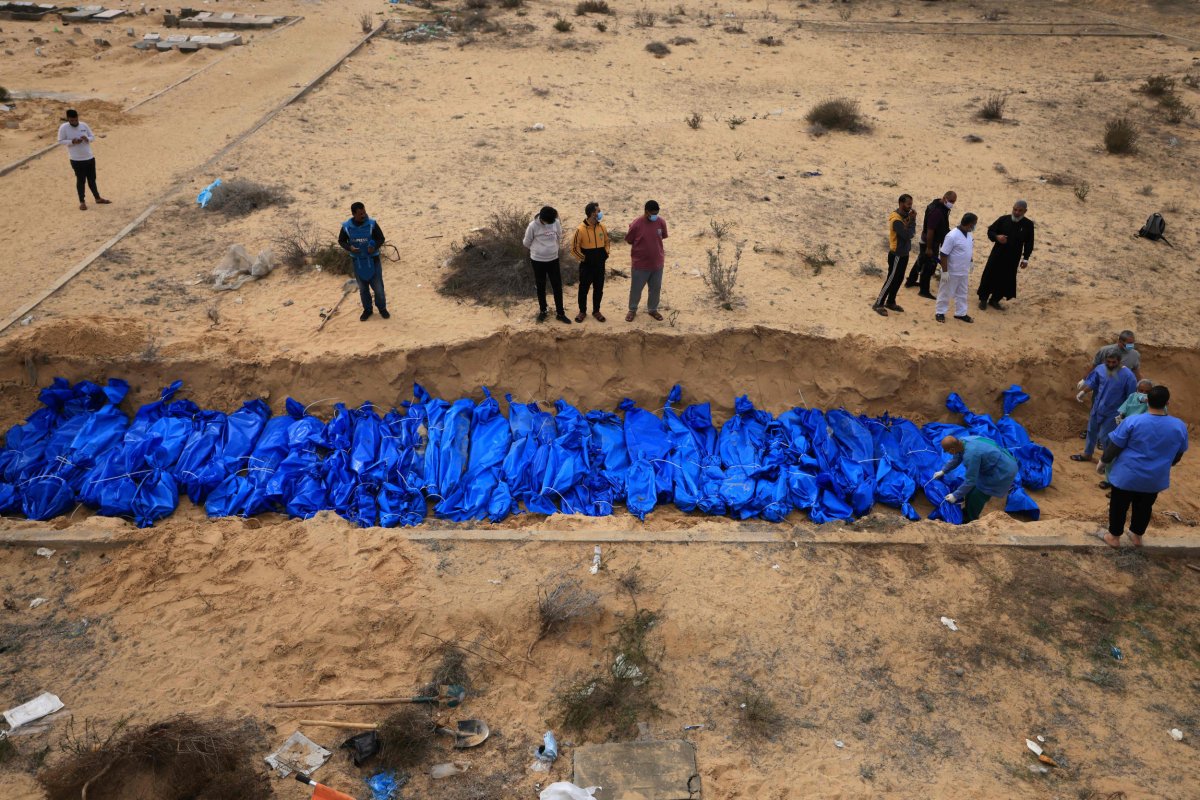The tentative Israel-Hamas agreement to free some hostages held in Gaza in exchange for the release of Palestinian prisoners held in Israel may bring much-needed relief to the Palestinian civilians withering under Israeli bombardment but will not form a basis for an end to the fighting, according to a former Israeli national security adviser.
"It is very clear to the decision makers that they cannot stop," Yaakov Amidror—who served as national security adviser under Prime Minister Benjamin Netanyahu from 2011 to 2013—told a Jerusalem Press Club briefing on Wednesday. "The Israeli sentiment will not let them.
"If they stop the war after the full five or six days of the ceasefire, that will be the end of this government. The sentiment within the military forces and the Israeli public is so strong to destroy Hamas that that cannot be stopped. And, of course, it will be the biggest test of this cabinet the minute that the ceasefire will be ended, formally."
The deal—reached with mediation from the U.S., Egypt and Qatar—will see 50 hostages released from the Gaza Strip in exchange for 150 Palestinian prisoners being held in Israeli jails, all women and children, according to Hamas. Among the hostages to be freed are American citizens, U.S. Secretary of State Antony Blinken confirmed on Tuesday.

A four-day ceasefire will also allow hundreds of humanitarian aid trucks to enter the besieged and devastated Gaza Strip from the Rafah border crossing with Egypt.
Hamas accounts of the deal said Israel will pause air operations in southern Gaza and restrict them to six hours per day in the north and will not bring any military ground vehicles into the Strip.
The Israeli government, meanwhile, said it would extend the ceasefire for one day for every 10 additional hostages released. Hamas has said the ceasefire will begin at 10 a.m. local time on Thursday, while the Israel Defense Forces (IDF) said it cannot confirm when the "operational pause" will begin.
Israeli officials had previously dismissed any ceasefire proposals, saying a pause would give Hamas an opportunity to reconstitute and prepare for the next phase of the Israeli invasion. But under intense domestic and international pressure, Netanyahu's emergency cabinet signed off on the deal to free a portion of the 240 or so hostages taken back to Gaza after Hamas' October 7 attack.
Some 1,200 people in Israel were killed in the Hamas infiltration operation. More than 11,000 Palestinians have been killed in Gaza in the subsequent Israeli operation there, according to Gaza Health Ministry figures cited by the Associated Press. At least another 160 Palestinians have been killed by Israeli security services and extremist settlers in the occupied West Bank, per AP figures, while the Palestinian Health Ministry has reported a toll of at least 225 killings.
Hugh Lovatt, a senior policy fellow at the European Council on Foreign Relations (ECFR) think tank, told Newsweek that the agreement represents "the first important diplomatic gain since the start of the war." Foreign governments, he said, "should ensure that urgent humanitarian aid now enters the Strip and should use this cessation of hostilities as an opportunity to wedge open space to advance a full ceasefire predicated on a wider diplomatic pathway."
The diplomatic breakthrough comes as the IDF nears the culmination of its attack into the northern part of the Strip. The IDF is expected to then turn south, moving toward the Hamas stronghold of Khan Younis and the border with Egypt in its campaign to eradicate the group that has controlled Gaza since 2007.
Amidror told Newsweek that the ceasefire constitutes a "risk" for the IDF as it prepares to strike southward.
"We are ready to take it because, at the end of the day, when we have to prioritize more risk for civilians or more risk for uniformed guys, we are taking the risk on the military side and not on the civilian side. So yes, here the IDF is taking the risk of releasing the hostages.
"It's blackmail. It means that we are giving them more time to be better prepared for the next stage of the of the war."
Newsweek has reached out to a Hamas spokesperson via WhatsApp for comment.

The former national security adviser, though, said the pause "will not change the balance of power between the IDF and Hamas. It's not an open space into which they can bring more forces from somewhere.
"They can move some of them to the south, some of them to the north in the tunnels maybe, if they still can. My assessment is that more people will run out of the area in the north into the south, and it will make the second phase of the fighting in the north easier."
Hamas is expected to continue its fierce resistance in the south of the Strip, particularly around the city of Khan Younis—the hometown of Hamas' leader in the Strip, Yahya Sinwar, and the commander of Hamas' Al-Qassem Brigades military wing, Mohammed Deif. Amidror said he believes the two men are calling the shots on day-to-day operations inside Gaza, with the group's leaders abroad mostly concerned with the long-term strategic picture.
"The preparation by the air force and the artillery should be much stronger," Amidror said of the coming southern campaign. "We understand that [Hamas] can build their capability in a better way because of the ceasefire.
"If the ceasefire is ended at 12 o'clock. At 12 o'clock and one minute, we are back in business."
There remains little clarity over the future shape of Gaza governance. Israeli forces have not maintained a permanent presence there since 2005. Defense Minister Yoav Gallant has promised a new security reality in post-war Gaza, and Netanyahu has said the country will retain overall security responsibility for the area for an indefinite period.

Figures including U.S. President Joe Biden have warned it would be a big mistake for Israeli forces to re-occupy Gaza. Some observers have proposed a return of the Palestinian Authority (PA) to the area following its ejection in the Hamas coup of 2007. But the weakened and corrupt body has shown little readiness to take up the challenge without a major shift in Israeli policy in the occupied West Bank.
"A post-conflict governance model for Gaza needs to be guided by what is immediately possible," Lovatt said. "Completely uprooting Hamas is an illusion given its deep roots in Gaza, even if Israel's military operation succeeds in weakening the group operationally.
"The immediate post-conflict international focus will need to address the immense humanitarian needs of Gaza's population, in a process that can only be overseen by the United Nations, rather than imagining the immediate construction of a new political order on top of the rubble.
"A new governance system that succeeds in dislodging Hamas will need to be Palestinian-owned, and a reformed PA is the only viable vehicle to take this forward. To challenge Hamas' domination and drain its public support, the PA will need to demonstrate its ability to secure Palestinian rights in the face of Israel's long-standing occupation.
"Without a viable horizon to end Israel's metastasizing occupation of Palestinian territory and secure Palestinian self-determination, there will be little prospect of exiting the cycle of conflict."
Uncommon Knowledge
Newsweek is committed to challenging conventional wisdom and finding connections in the search for common ground.
Newsweek is committed to challenging conventional wisdom and finding connections in the search for common ground.
fairness meter
To Rate This Article
About the writer
David Brennan is Newsweek's Diplomatic Correspondent covering world politics and conflicts from London with a focus on NATO, the European ... Read more
To read how Newsweek uses AI as a newsroom tool, Click here.








